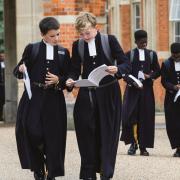Ruth Poyner explains a unique opportunity for families...

Plato said, “Music gives soul to the universe, wings to the mind, and flight to the imagination”, and if we wanted to test his theory then a good place to start might be sitting in Chichester Cathedral, listening to the Cathedral Choir. Surrounded by beautiful architecture, and cocooned by the peaceful atmosphere in this 900 year-old place of worship, it is still hard to describe just how uplifting – almost transporting – it can be listening to the six men and 18 boys. Even the choristers, who sing 6 days a week, find it hard to convey. Peter Hamlyn, a chorister who is “almost 12,” says with a big smile: “It’s exciting and it’s very interesting. The music is really, really nice...it’s not music as most people know it. I don’t know how to describe it, it’s different. It affects me, it’s quite moving actually.”

This year, Chichester Cathedral is working hard to raise funds for its choir – a choir that is part of an English Choral Tradition that stretches back 450 years. In December 2013 the Cathedral Chapter launched a fundraising campaign asking for donations to a newly formed Chichester Cathedral Choral Foundation Fund, and this new initiative hopes to publicise one of the county’s best kept secrets. The Choral Foundation Fund has been specifically created to protect a principle that has been at the heart of the Cathedral’s policy for many years now – namely that boys of any background, and any financial means, can become a chorister at Chichester Cathedral. Choristers are educated at the Prebendal School (one of the leading independent schools in the South) and the Cathedral Chapter is committed to awarding all choristers 50% of the full boarding fees. Additional bursaries, up to 100%, are even available if full funding is needed. This new fund, therefore, will ensure that this unique opportunity is available to any boy, irrespective of his family circumstances.
Being a chorister is no small undertaking, excellent schooling is combined with regular choir practice and singing at many of the Cathedral’s services – it is quite a timetable. But the rewards are substantial.The Prebendal School dates from 1497 and offers a nurturing environment with few more than 200 children and classes no bigger than 16 at a time. This historic setting is nestled in the centre of Chichester alongside the Cathedral Close and together they form something of an oasis in the heart of the city – but with all the cultural and learning opportunities that a city centre location brings.
Not all families are immediately comfortable with the idea of their child leaving home to board at school but the arrangement can allow for three nights at home per week. Chorister parent Margaret Ellwood, whose nine-year-old son Conrad is in the choir, describes the Cathedral/Prebendal network as a close-knit and supportive community where the children, parents and staff all know each other, “We feel phenomenally lucky - everyone supports each other. I never feel as though Conrad has left the family – I feel as though I have acquired more.”
For a musical child, a choristership may well turn out to be a very “lucky” start as the opportunities for choristers can be life-changing. The choir sings approximately 750 pieces of music per year and around 20 different works each week. This daily tuition fosters accomplished and sought-after singers who, even though they are young, perform with professional orchestras and participate in broadcasts, recordings and overseas tours. In recent years, for example, the choir has travelled to France, Germany, Italy and South Africa.
Ex-Chichester chorister, Tom Robson, is now 25 years old and a successful freelance tenor. He sings regularly with the choir at Westminster Cathedral and also performs internationally with other highly regarded professional choirs such as The Kings Consort, Gabrieli Consort and Tenebrae. He sees himself as ‘so lucky’ to have been a chorister – explaining that this training gave him a head start: “Choristers learn to sing new music every day to a very high quality, with very little rehearsal time: they learn to create a polished performance within seconds.”
Chorister mum Margaret is not sure if her son Conrad has a similar future in store, “Who knows, he might want to be a pilot, we will let him decide,” but interestingly she sees her son learning lots of other important skills, “The choir form much closer relationships than in other schools, and across year groups too, as they are all different ages. They are part of a team and support each other; I see a sense of belonging. Singing also helps them to learn to express themselves.”
Chorister Peter proves this point too, with reflections that sound ahead of his 11 years, “Sometimes you fall out with one another and you just have to get on with it. You really need to be able to get on with people. You need to be able to share with people. When you are about to do a solo, you’re really nervous and thinking I’m going to go wrong, but you’ve got to know how to make yourself heard. But when you’re working in a choir you are a team and have to make room for others, you can’t stand out, it needs to sound like one voice. You need to know how to do both things.”
Peter is also clear on another point; “It’s fun – definitely,” he says, “We get through a lot of activities. We get to go on choir tours, I’ve been to Germany and Italy – I’d never been to Germany and Italy before – we have choir holidays, and the Matrons organise lots of activities for us. They set up table tennis and pool and snooker, there are lots of things that are one-off experiences.”
Peter’s “one-off” experiences are part of larger unique package – where daily singing in a majestic setting, sometimes to hundreds of people, is combined with a private education and experiences that build confidence and character. But this special opportunity is also open to applicants from any means, and they don’t have to be experienced or skilled singers – they just need to love singing. So for the right child, and the right family, this unusual opportunity might just be the start of many special things to come.



























